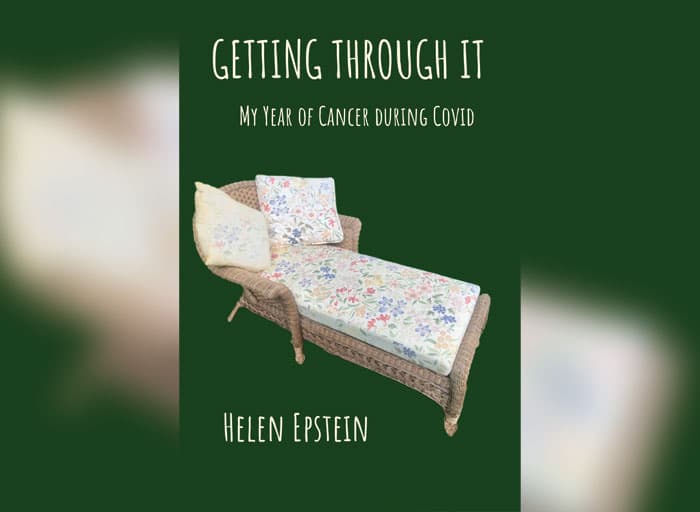
At the beginning of the COVID pandemic, as the world was locking down to deal with a mysterious, new disease, writer Helen Epstein was diagnosed with endometrial cancer, a cancer that begins in the uterus and has affected 600,000 American women.
For a year, she went through surgery, chemotherapy and radiation treatment, and reflects on these experiences in her new book, “Getting Through It: My Year of Cancer During COVID.” In it, she describes how she navigated treatment with the help of her husband, and combines research with memoir to tell her story.
“When I was diagnosed with gynecologic cancer, I looked for a good book to orient me and couldn’t find one,” Epstein said to the Journal. “Gilda Radner wrote her memoir in the 1980s and her treatment was outdated. The movie ‘Wit’ was so terrifying I couldn’t watch it. So, since I’m a veteran journalist, I decided to write my own book.”

Epstein, who also wrote the non-fiction trilogy “Children of the Holocaust,” started teaching journalism at New York University in 1974, becoming the first woman in her department to be awarded tenure. As a journalist, she’s been published in the Sunday New York Times, the Washington Post, the Jerusalem Post and New York Magazine.
“Getting Through It” gives the reader a detailed and personal, step-by-step look at what led up to Epstein’s diagnosis and what cancer treatment is really like. She talks about her husband’s infertility early on their marriage and the two miscarriages that bonded them (eventually, they would go on to have two sons). Reflecting on one of the first appointments with her oncologist, Epstein writes about the pain she experienced during a biopsy.
“For years I had been having mammograms and Pap smears and colonoscopies without much drama. I found them uncomfortable, sometimes awkward, often invasive, but they did not leave me feeling shattered. Endometrial biopsies do. Because an endometrial biopsy is so brief – only two or three minutes long – most American doctors do not offer general sedation for the procedure. But however short, this biopsy is excruciating.”
During her tumultuous journey with cancer, Epstein, who describes herself as a secular Jew, said she gained strength because of her parents’ experiences during the Shoah.
“Both my parents were Holocaust survivors from Czechoslovakia. They both were the sole survivors of their families. I was especially close to my mother and knew her story very well. I had a great model for survival.” – Helen Epstein
“Both my parents were Holocaust survivors from Czechoslovakia. They both were the sole survivors of their families. I was especially close to my mother and knew her story very well. I had a great model for survival.”
One of the valuable lessons Epstein learned was how important it was for her to figure out what she needed, and to have a reliable partner by her side in the process.
“You need to decide what’s best for you, have a partner who backs you up and tune out the noise.” – Helen Epstein
“Cancer brings out the worst in some people,” she said. “I heard impassioned arguments for doing exactly what my doctors said, as well as impassioned arguments against all of western medicine. You need to decide what’s best for you, have a partner who backs you up and tune out the noise.”
Epstein dedicated the book to other women who went through the same illness to help them feel less alone in their struggles.
“Some women prefer to keep it private,” she writes. “Some want to know only what their doctors tell them. Others go online to learn everything they can. Many, like the women who got in touch with me after they heard I had endometrial cancer, want to hear how another woman got through treatment and came out standing. This book is for all of them.”
After going through treatment and writing the book, Epstein is doing well. She has some residual neuropathy in her toes from the chemo, but said it’s not a big problem. She’s also working on a new book about friendship, which is something she said she “learned a lot more about during cancer.”
Epstein’s experience was frightening and difficult, but some positivity is coming from it: she is giving other people who are dealing with similar circumstances hope.
“[I want my readers to see] the perspective that thousands of other people like you have been through cancer treatment and, however rough it gets, you will get through it,” she said. “I take the reader through a tunnel that includes surgery, chemo, radiation and two mini-strokes and here I am… If I can [be here], you can too.”






















 More news and opinions than at a Shabbat dinner, right in your inbox.
More news and opinions than at a Shabbat dinner, right in your inbox.